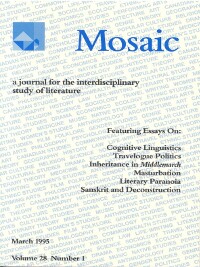Issue 28.1
Overview

General Issue
Published: January 1995
See the issue summary and contents below.
6 essays, totalling 152 pages
$15.00 CAD
This issue of Mosaic includes essays focusing on the potential contributions of cognitive linguistics to literary and critical studies, nineteenth-century Irish travelogues, George Eliot’s treatment of wills, D.H. Lawrence and masturbation, parody and paranoia in Vladimir Nabokov’s Pnin, and Sanskrit poetry’s resistance to the limited outcomes of deconstruction.
Cognitive Linguistics: The Experiential Dynamics of MetaphorF. Elizabeth Hart Cognitive linguistics is a relatively new interdisciplinary approach to language theory that focuses on the radically constructive properties of “conceptual metaphor.” This essay explores the contributions that cognitive linguistics makes to literary studies, in terms both of its applications to close textual analysis and its implications for critical theory. | |
Stranger in Ireland: The Problematic s of the Post-Union TravelogueGlenn Hooper Ireland’s relationship to Britain was substantially altered by the Act of Union of 1 January 1801. This essay argues that such legislation acted as the focus for travelers to Ireland in the early years of the nineteenth century, resulting in a highly developed discourse of colonial and imperial appropriation. | |
Inheritance as the Key to all Mythologies: George Eliot and Legal PracticePaul Milton In George Eliot’s later novels, inheritances often prove problematic for female characters. By examining her use of contemporary legal theory, this essay shows how Eliot’s treatment of wills differs from that of her male contemporaries in its sensitivity to the impact of inheritance on female identity. | |
Lawrence, Freud and MasturbationJames C. Cowan Both D.H. Lawrence and Sigmund Freud opposed masturbation and warned against its harmful effects. Lawrence’s late adolescent masturbatory experience and fantasies, insofar as these can be inferred from his early poetic and prose statements related to the subject, are examined from both traditional Freudian and post-Freudian psychoanalytic perspectives. | |
The Art of Conspiracy: Punning and Paranoid Response in Nabokov’s PninChristy L. Burns In Pnin, Vladimir Nabokov relates paranoid constructions not only to characters but also implicitly to the nature of representation and interpretative processes. This essay places Pnin within the context of psychoanalytic literature on paranoia and postmodern discussions of subjectivity, focusing on Nabokov’s parody as potential assuagement of postmodern paranoia. | |
Deconstruction and Sanskrit PoeticsWilliam S. Haney II Comparing Derrida with two Indian philosophers, Bhartrhari and Shankara, this essay argues that the attempt to deconstruct logocentrism reflects a limited rather than a comprehensive view of the full range of language and the self, and that the knowledge of expanded awareness available through Sanskrit poetics can take one beyond the oppositions inherent in deconstruction. |